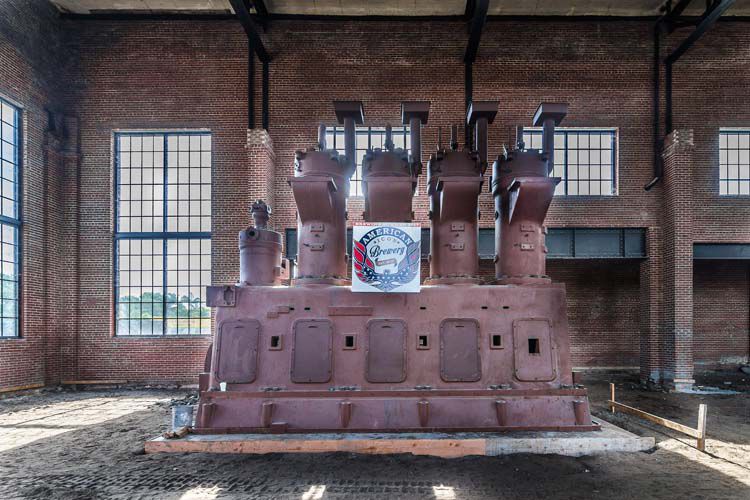
If you were hoping to celebrate the 4th of July at the new American Icon Brewery, you are going to have to hoist your toast to the good old U.S.A. at some other location.
The fun is now not scheduled to start at developer Michael Rechter’s new dining and drinking establishment until Labor Day, or later. His building permit had a slower-than-anticipated slog through the county’s permitting process, and that caused a delay of more than a month in starting the massive renovation of the old diesel power plant.
Even more impenetrable was the six-foot concrete slab crews encountered when demolition got underway. It was twice the thickness they anticipated, and extended under what was believed to be a dirt floor in one corner of the hulking brick shell.
While it proved expensive to break up and haul away – amounting to more than a million pounds of rubble, according to Rechter – it was a silver lining, literally, in the case of another intransigent problem. The concrete served as a barrier to the EPA-monitored contamination that resulted from decades of spilled diesel fuel. That fuel, brought in on tanker cars running on the adjacent railroad tracks, ran the huge generators that produced Vero Beach’s electricity for nearly 50 years.
Now instead of fuel tanks, the structure will be home to fermentation tanks, seven of them to start with, each holding 30 barrels of beer. That’s enough to serve not only the on-site beer drinkers but those in bars and restaurants within distribution range.
When it is set up and operating in the building’s southwest corner, the brewing will take place behind glass walls that allow patrons to watch the action.
Last week, Rechter got to sip the first iteration of his brewery’s products, a taste-testing of beers made in a small-scale brewery housed at Majestic Plaza. “I like all this construction, but what’s cool, what excites me is the lab,” he says.
The pilot system, run by American Icon’s new brewmaster, Jesse Robles, brews five-gallon batches to test out recipes on a small scale. Robles, used a similar system when he learned to brew at the Siebel Institute of Technology in Chicago, and later in Germany. For the past three years, he has worked for the contract brewer Florida Beer Company in Cape Canaveral.
Rechter’s right-hand man in the ambitious diesel plant brewery project is Ken Dodd, formerly director of operations for the Yardhouse chain of 67 pubs. He is now running Rechter’s food, beverage and entertainment company, Integra Hospitality, which includes the brewery as well as Vero Bowl Lanes and Lounge, also in Majestic Plaza. Integra also includes a new restaurant Rechter is developing in Fort Lauderdale in an up-and-coming arts district called FAT Village near Rechter’s home.
At the brewery, buried lines running from an outside cooler will shoot the beer to the bar taps, which will emerge from cast-iron holes in the one remaining generator. That huge engine holds a place of honor in the brewery; it will be the centerpiece of the bar.
Its new concrete pad was poured before anything else, while the engine was parked outside being gutted, cleaned up and primed. Moving the generator in and out involved heavy equipment and a flat-bed truck.
Now back in place on the fresh, steel-reinforced concrete slab, the generator awaits a final coat of paint, a return to the engine’s original colors: red for the stacks and black for the body.
Rechter is the first private owner of the property since the structure was built as Vero’s first municipal power plant in 1926. His purchase deal closed in June of last year, in the middle of an unrelated trial over the plant involving the city and the plant’s last tenants, developers Phil Barth and David Croom.
After pouring $1.5 million into the project, Barth and Croom blamed project delays on diesel contamination that the city was required to remediate. The city won that suit and a countersuit for rent owed by the developers.
Traces of contaminant remain today, but it is Rechter who assumes any further remediation burden. He got a $150,000 discount on the $650,000 price tag for the property by assuming responsibility for the clean-up. The brewery transformation is expected to cost $1.7 million, pushing his investment to at least $2,350,000.
Friday, diesel fumes filled the plant’s cavernous space, not from decades-old fuel residue but from a concrete mixer that suddenly roared into the building through a giant garage door in the rear. With a clunk, the operator set the mixer’s spout to pour footers for the mezzanine.
That upper level will be accessed by stairs as well as a glass-front elevator, affording additional views.
For now, though, the vista is nothing but dirt, not only inside but outside, where the future 60-space parking lot was a giant mud puddle after an early summer downpour. Storm drains have been installed. Curbs go in next. Another 60 cars can park at the city lot across the street.
As if the brewery project weren’t enough, Rechter is about ready to move ahead with improvements to another building he owns downtown, this one on 14th Avenue. The former post office turned physical therapy clinic will be divided into three spaces, and the side lot will have a fenced-in covered terrace with tables and chairs.
Two tenants, a bar and restaurant called Post and Vine and a hair salon called Boho House, have already signed leases. Work is expected to start after Memorial Day.
“I’ve got this project that will change the world,” Rechter says, surveying the bare-bones diesel plant. “And what’s going in on 14th Avenue is going to be exceptional. We’re going to create some drama downtown, and in a good way. People will get off the beach a little bit and come downtown. This is going to be a destination and not just for Vero.”



